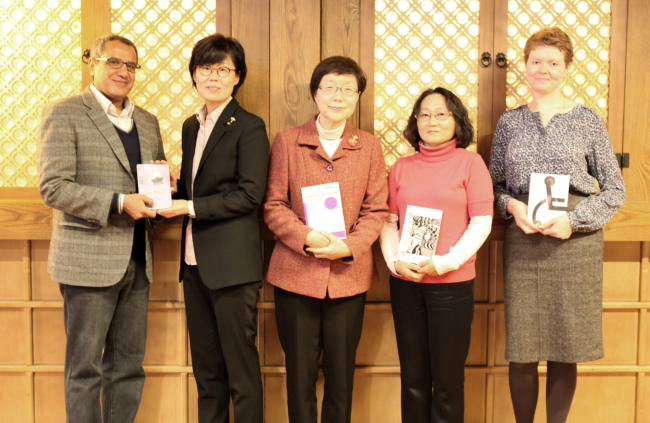Translation award honors Suh Ji-moon
Scholar given Korean Literature Translation Award for ‘House with a Sunken Courtyard’
By Korea HeraldPublished : Nov. 18, 2014 - 20:59
When emeritus professor Suh Ji-moon first began translating Korean literature into English in the 1970s, she used to write by hand or use a typewriter, which required writing and retyping over and over again before submission.
Though times have changed, the prominent Korean scholar with a 40-year career in teaching, research and literary translation still admits that translating is difficult, often accompanied by frustration and distress. Yet, it is a fulfilling experience, just like a time-consuming and strenuous search for hidden jewelry.
Now, the 66-year-old scholar has received an award for her efforts. On Monday, Suh won the top prize at the 12th annual Korean Literature Translation Awards for translating Kim Won-il’s “House with a Sunken Courtyard” into English. The award is given by Korea’s state-run Literature Translation Institute of Korea.
“For me, the most difficult yet important aspect of translating is to help readers understand the context easily, while providing minimal information,” said Suh during an interview with The Korea Herald before the award ceremony. “Deciding which and how much information is necessary to convey the right meaning is critical.”
Suh believes that literature has to be fun. “Each sentence should carry charm and wit for the readers, and in order to do that, overcoming the cultural context is crucial,” he said.
Though times have changed, the prominent Korean scholar with a 40-year career in teaching, research and literary translation still admits that translating is difficult, often accompanied by frustration and distress. Yet, it is a fulfilling experience, just like a time-consuming and strenuous search for hidden jewelry.
Now, the 66-year-old scholar has received an award for her efforts. On Monday, Suh won the top prize at the 12th annual Korean Literature Translation Awards for translating Kim Won-il’s “House with a Sunken Courtyard” into English. The award is given by Korea’s state-run Literature Translation Institute of Korea.
“For me, the most difficult yet important aspect of translating is to help readers understand the context easily, while providing minimal information,” said Suh during an interview with The Korea Herald before the award ceremony. “Deciding which and how much information is necessary to convey the right meaning is critical.”
Suh believes that literature has to be fun. “Each sentence should carry charm and wit for the readers, and in order to do that, overcoming the cultural context is crucial,” he said.

“Translating sentence by sentence alone cannot deliver the unique cultural context and rich traditions,” the scholar added. “That is where the role of the translator’s judgment comes in. Depending on the translator, the meaning of the context can change drastically.”
“House with a Sunken Courtyard” is one of many works translated by Suh. She translated this story about the tumultuous lives of Koreans after the Korean War while she was going through the hardest time of her life in 2008, receiving chemotherapy after cancer surgery. For this reason, this award feels even more personal for her.
When asked what experiences contributed to her translation, she credits her experience of living in the U.S. for seven years during her graduate studies and research. More important was the literature that introduced her to different cultures and the English language at a young age.
“When I was in college, I enjoyed reading English literature so much, more than eating sometimes,” Suh said with a smile. “Through literature, I learned about the roles of tradition and how people’s consciousness is formed and developed into different cultures. It is important to understand other cultures in order to communicate my culture to them.”
“Because amid all the cultural differences, I have to discover the common aspect of human nature and communicate it through literature,” said Suh.
Suh agreed that though we live in a time when mass culture and popular literature prevail over pure literature, it is important to keep translating enriched Korean literature that is lesser-known in other countries. “It is very difficult for pure literature to become popular. Nevertheless, it is important to raise awareness that Korea is popular for not only K-pop but also Korean literature.”
Four other translators shared the prize at the award ceremony on Monday. Russian scholar Maria Kuznetsova received an award for translating Lee Seung-woo’s 2000 novel “The Private Life of Plants” into Russian. She stated that Russian people, with their fondness of philosophical works by authors such as Dostoevsky, will be able to connect when reading Lee’s novel.
Korean scholar Cho Hee-sun, who currently teaches Arabic language and culture at Myongji University, and Egyptian scholar Mahmoud Abdel Ghaffar, who translated poet Ko Un’s anthology “Abiding Places, Korea North and South,” received the honor for cotranslating “A Journey to Seoul,” poet Kim Kwang-kyu’s poem collection, into Arabic.
Translator Im Yun-jung, who immigrated to Brazil at 10, received an award for translating Han Kang’s 2007 novel “A Vegetariana” into Portuguese.
By Ahn Sung-mi (sahn@heraldcorp.com)
-
Articles by Korea Herald



![[Herald Interview] 'Amid aging population, Korea to invite more young professionals from overseas'](http://res.heraldm.com/phpwas/restmb_idxmake.php?idx=644&simg=/content/image/2024/04/24/20240424050844_0.jpg&u=20240424200058)













![[KH Explains] Korean shipbuilding stocks rally: Real growth or bubble?](http://res.heraldm.com/phpwas/restmb_idxmake.php?idx=652&simg=/content/image/2024/04/25/20240425050656_0.jpg&u=)

